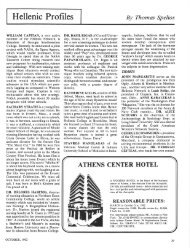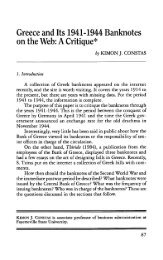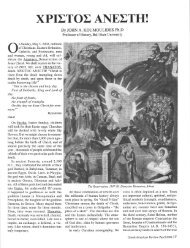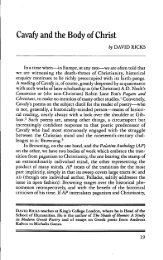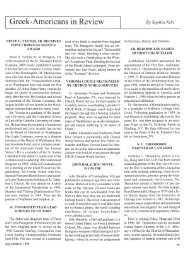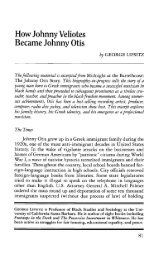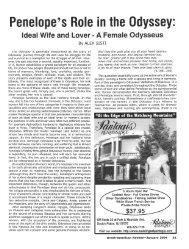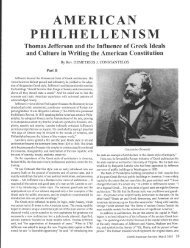The History Man
The History Man
The History Man
You also want an ePaper? Increase the reach of your titles
YUMPU automatically turns print PDFs into web optimized ePapers that Google loves.
38 JOURNAL OF THE HELLENIC DIASPORA<br />
can be read in the same spirit as the poem "In the Month of Athyr," as<br />
a human testament at once present and infinitely remote. But the poem<br />
becomes more interesting when the speaker tells us that the author of the<br />
epitaph was a poet who knew almost nothing about the dead man. <strong>The</strong><br />
purpose of the epitaph, potentially a tiny piece of the source material of<br />
history, turns out to have been not so much to record the facts of the<br />
young man's death, as to console or possibly to flatter a bereaved relative.<br />
And the irony is that the poet's well-meant shot in the dark has misfired<br />
badly: Kimon's true feelings are dominated by bitterness toward his dead<br />
cousin over the very relationship so idyllically extoled in the poet's<br />
epitaph. And the epitaph, immortalizing that relationship in verse, puts<br />
Kimon's lover Hermoteles forever out of his reach.<br />
One effect of this poem is to cast doubt on the truth of the historical<br />
record as a transcription of actual experience. But it also introduces a<br />
new figure into the business of recording history: the poet. Since he<br />
knows almost nothing, and in any case could never know the literal truth<br />
of what he has written in the epitaph, the poet can only have created the<br />
whole text out of his imagination. Truth to fact (historical truth) is<br />
blatantly subverted by the interfering well-wisher, the poet. But what the<br />
poet has written has a power and permanence that have nothing to do<br />
with its truth: thanks to the poet's work, the dead Marullus will always<br />
come between Kimon and the object of his desires, Hermotêles.<br />
Two poems which deal not with inscriptions but with the business of<br />
writing history are also important here. <strong>The</strong> first is "King Demetrios"<br />
(1900/1906: A27, tr. 18) :<br />
Not like a king, but as an actor, he disguised himself in a dark<br />
cloak instead of that tragic costume, and slipped way unnoticed.<br />
Plutarch, Life of Demetrios<br />
When the Macedonians deserted him<br />
and proved they would rather follow Pyrrhos<br />
King Demetrios (great<br />
was his soul) did not at all—so it was said—<br />
behave like a king. He went<br />
and doffed his golden garments,<br />
kicked off his royal sandals<br />
all of purple. In simple dothes<br />
he quickly dressed and fled.<br />
Doing as an actor does<br />
who when the show is over,<br />
changes his clothes and comes away.<br />
<strong>The</strong> essence of this seemingly simple poem is that Cavafy's text retells<br />
precisely the same facts—no more, no less—as the historian Plutarch in the<br />
"Life" from which the epigraph is taken, but completely changes their<br />
meaning. <strong>The</strong> historical record (unimaginatively) condemns the loser



